-
 British singer Olivia Dean wins Best New Artist Grammy
British singer Olivia Dean wins Best New Artist Grammy
-
Hatred of losing drives relentless Alcaraz to tennis history
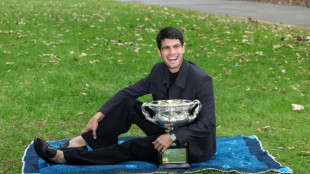
-
 Kendrick Lamar, Bad Bunny, Lady Gaga win early at Grammys
Kendrick Lamar, Bad Bunny, Lady Gaga win early at Grammys
-
Surging euro presents new headache for ECB
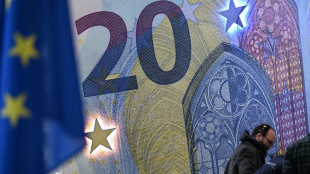
-
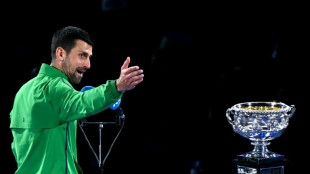 Djokovic hints at retirement as time seeps away on history bid
Djokovic hints at retirement as time seeps away on history bid
-
US talking deal with 'highest people' in Cuba: Trump

-
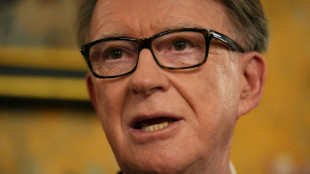 UK ex-ambassador quits Labour over new reports of Epstein links
UK ex-ambassador quits Labour over new reports of Epstein links
-
Trump says closing Kennedy Center arts complex for two years
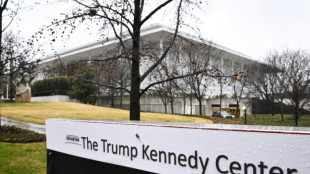
-
 Reigning world champs Tinch, Hocker among Millrose winners
Reigning world champs Tinch, Hocker among Millrose winners
-
Venezuelan activist ends '1,675 days' of suffering in prison

-
 Real Madrid scrape win over Rayo, Athletic claim derby draw
Real Madrid scrape win over Rayo, Athletic claim derby draw
-
PSG beat Strasbourg after Hakimi red to retake top spot in Ligue 1

-
 NFL Cardinals hire Rams' assistant LaFleur as head coach
NFL Cardinals hire Rams' assistant LaFleur as head coach
-
Arsenal scoop $2m prize for winning FIFA Women's Champions Cup

-
 Atletico agree deal to sign Lookman from Atalanta
Atletico agree deal to sign Lookman from Atalanta
-
Real Madrid's Bellingham set for month out with hamstring injury

-
 Man City won't surrender in title race: Guardiola
Man City won't surrender in title race: Guardiola
-
Korda captures weather-shortened LPGA season opener

-
 Czechs rally to back president locking horns with government
Czechs rally to back president locking horns with government
-
Prominent Venezuelan activist released after over four years in jail

-
 Emery riled by 'unfair' VAR call as Villa's title hopes fade
Emery riled by 'unfair' VAR call as Villa's title hopes fade
-
Guirassy double helps Dortmund move six points behind Bayern

-
 Nigeria's president pays tribute to Fela Kuti after Grammys Award
Nigeria's president pays tribute to Fela Kuti after Grammys Award
-
Inter eight clear after win at Cremonese marred by fans' flare flinging

-
 England underline World Cup
credentials with series win over Sri Lanka
England underline World Cup
credentials with series win over Sri Lanka
-
Guirassy brace helps Dortmund move six behind Bayern

-
 Man City held by Solanke stunner, Sesko delivers 'best feeling' for Man Utd
Man City held by Solanke stunner, Sesko delivers 'best feeling' for Man Utd
-
'Send Help' debuts atop N.America box office

-
 Ukraine war talks delayed to Wednesday, says Zelensky
Ukraine war talks delayed to Wednesday, says Zelensky
-
Iguanas fall from trees in Florida as icy weather bites southern US

-
 Carrick revels in 'best feeling' after Man Utd leave it late
Carrick revels in 'best feeling' after Man Utd leave it late
-
Olympic chiefs admit 'still work to do' on main ice hockey venue

-
 Pope says Winter Olympics 'rekindle hope' for world peace
Pope says Winter Olympics 'rekindle hope' for world peace
-
Last-gasp Demirovic strike sends Stuttgart fourth

-
 Sesko strikes to rescue Man Utd, Villa beaten by Brentford
Sesko strikes to rescue Man Utd, Villa beaten by Brentford
-
'At least 200' feared dead in DR Congo landslide: government

-
 Coventry says 'sad' about ICE, Wasserman 'distractions' before Olympics
Coventry says 'sad' about ICE, Wasserman 'distractions' before Olympics
-
In-form Lyon make it 10 wins in a row

-
 Man Utd strike late as Carrick extends perfect start in Fulham thriller
Man Utd strike late as Carrick extends perfect start in Fulham thriller
-
Van der Poel romps to record eighth cyclo-cross world title

-
 Mbappe penalty earns Real Madrid late win over nine-man Rayo
Mbappe penalty earns Real Madrid late win over nine-man Rayo
-
Resurgent Pakistan seal T20 sweep of Australia

-
 Fiji top sevens standings after comeback win in Singapore
Fiji top sevens standings after comeback win in Singapore
-
Alcaraz sweeps past Djokovic to win 'dream' Australian Open

-
 Death toll from Swiss New Year bar fire rises to 41
Death toll from Swiss New Year bar fire rises to 41
-
Alcaraz says Nadal inspired him to 'special' Australian Open title

-
 Pakistan seeks out perpetrators after deadly separatist attacks
Pakistan seeks out perpetrators after deadly separatist attacks
-
Ukraine war talks delayed to Wednesday, Zelensky says

-
 Djokovic says 'been a great ride' after Melbourne final loss
Djokovic says 'been a great ride' after Melbourne final loss
-
Von Allmen storms to downhill win in final Olympic tune-up

Nuclear weapons for Poland against Russia?
As Donald Trump’s second term as U.S. President intensifies global tensions, a volatile mix of international defiance and regional military posturing is emerging, with Poland at the centre of a brewing storm. Amidst protests against Trump’s policies, speculation about nuclear escalation and Poland’s strategic moves against Russia have raised alarms, encapsulated in the provocative phrase circulating among activists and commentators: "We are ready for war." Yet, the reality behind these developments remains grounded in diplomatic friction and military preparedness rather than imminent conflict.
Trump’s inauguration on 20 January 2025 marked a return to his "America First" stance, including a pledge to reassess U.S. commitments to NATO, announced in a speech in Texas on 25 January. This has sparked outrage across Europe, with protests erupting in cities like Paris and Berlin. On 28 January, French activist Élise Moreau told a crowd of 12,000 outside the U.S. Embassy in Paris—according to police estimates—that "we are ready for war" against Trump’s "disruptive unilateralism." Similar sentiments have echoed in Warsaw, where Polish citizens and officials fear that a weakened NATO could embolden Russia’s ambitions in Eastern Europe.
Poland’s response has been swift and assertive. On 5 March, the Polish Ministry of Defence confirmed the deployment of an additional 10,000 troops to its eastern border with Belarus and Ukraine, citing "heightened Russian military activity" in the region. This followed reports from the Ukrainian General Staff on 2 March that Russia had amassed 50,000 troops near its western frontier, though Moscow denied any aggressive intent. Poland’s Foreign Minister, Anna Kowalska, stated on 7 March that "Warsaw will not wait for threats to materialise," framing the troop surge as a defensive "gambit" to deter Russian advances.
The spectre of nuclear weapons has further inflamed rhetoric. On 10 March, a senior Polish MP from the ruling Law and Justice Party, Janusz Kowalski, suggested in a televised debate that Poland might seek NATO nuclear sharing agreements "if the U.S. wavers." This echoed Trump’s own comments on 8 March in Florida, where he hinted at reconsidering America’s nuclear umbrella over Europe, stating, "Allies need to pay their share, or they’re on their own." No evidence suggests nuclear weapons are currently "on the way" to Poland, but the remarks have fuelled speculation and alarm, amplified by posts on X claiming "nukes" are imminent.
Across the Atlantic, Trump has dismissed the backlash. At a rally in Michigan on 15 March, attended by an estimated 18,000 supporters according to local authorities, he called European critics "freeloaders" and reiterated his intent to renegotiate defence pacts. The White House followed this with a statement on 16 March, asserting that "no changes to NATO’s nuclear posture are under consideration," attempting to quell fears of escalation.
In Europe, reactions vary. Germany’s Foreign Ministry expressed "deep concern" on 12 March about Poland’s troop movements, urging restraint to avoid provoking Moscow. Meanwhile, NATO Secretary General Mark Rutte announced on 17 March that the alliance would hold emergency talks in Brussels next week to address "cohesion and deterrence" amid Trump’s pressures. Analysts note that Poland’s actions align with its long-standing policy of bolstering its military—its defence budget reached 4% of GDP in 2024, per World Bank data—reflecting fears rooted in Russia’s 2022 invasion of Ukraine.
The "ready for war" rhetoric, while widespread, remains symbolic. Dr. Katarzyna Zielinska, a security expert at Jagiellonian University in Krakow, told this publication, "Poland’s gambit is about deterrence, not aggression. Talk of war—or nukes—is an expression of anxiety, not a plan." Still, the situation is precarious. The International Institute for Strategic Studies reported on 14 March that Russian air patrols near Polish airspace increased by 20% in February 2025 compared to the previous year, heightening regional tensions.
For now, the international rebellion against Trump and Poland’s military stance are distinct but intertwined threads in a broader tapestry of uncertainty. Protests continue—organisers in London are planning a rally for 25 March—while Poland’s border fortifications proceed. Whether these developments signal a genuine slide towards conflict or a recalibration of global alliances remains unclear. What is certain is that Trump’s shadow, and Russia’s looming presence, have set the stage for a critical test of resolve in the months ahead.

Germany: Migration reform package

Trump needs to avoid debt Collapse

The Roman Empire and its downfall?

Argentina, Milei and the US dollar?

Is this Europe's plan for China?

Donald J. Trump: America is back

Meta's announcements and digital services?

Hungary: China's CATL battery factory

Alice Weidel: AfD Chancellor Candidate 2025

Russia: Is Putin's time nearly up?

China, Trump, and the power of war?



